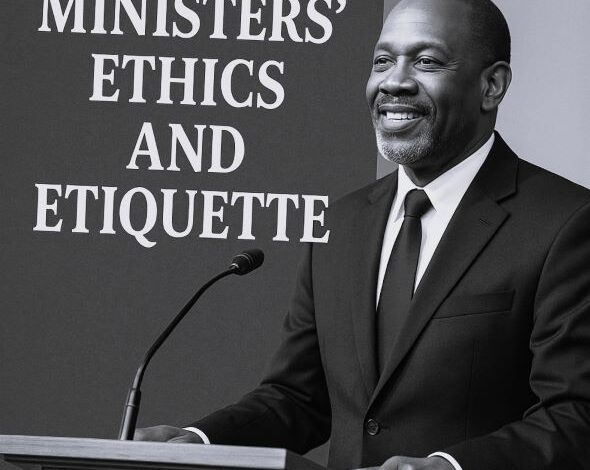
|
Getting your Trinity Audio player ready...
|
Standard Of Servanthood & Service.
Biblical Background: I Timothy 3:1–7, Titus 1:5–9, II Corinthians 6:3–10, I Peter 5:1–4
The calling to ministry is not a career; it is a divine entrustment. We are not just handling messages; we are handling people’s lives, eternal destinies, and God’s reputation on earth. That’s why ethics (what we do) and etiquette (how we do it) are not optional; they are fundamental to sustaining integrity in ministry. Daniel stood in politics yet was blameless. No scandal, no compromise, no pride. “Then the presidents and princes sought to find occasion against Daniel… but they could find none… for as much as he was faithful…” Daniel 6:4.
WHAT IS MINISTERIAL ETHICS?
Ministerial ethics refers to the moral principles and standards that govern the behavior, character, and decisions of a minister in private and public life. It deals with doing right before God and man. Titus 2:7 states “In everything set them an example by doing what is good.”
There are vital areas of Ministerial Ethics, these include:
A. Personal Integrity: Ministers must be the same in the pulpit and in private. What we preach must not contradict what you practice (Proverbs 11:3). We must not be public success but private failures. There must not be any form of discrepancy between what we are and what we try to project on the pulpit.
B. Financial Integrity: We must handle church and personal finances with accountability, transparency, and accurate documentation. Don’t be driven by what is in the members’ hands; be burdened for what is in their hearts. Every minister must avoid manipulation or using your position to coerce giving. We must not manipulate nor deceive members into giving (I Timothy 6:10).
C. Sexual Purity: Never trade eternal relevance for temporary pleasure. Avoid inappropriate closeness, secrecy, and counsel sessions with the opposite sex behind closed doors. Be proactive and careful, guard your heart diligently and be disciplined (I Corinthians 9:27). God will forgive but the people will never forget.
D. Teachability and Accountability:
This is the minister’s ability to submit to spiritual authority (Hebrews 13:17). Through the pages of the scripture, we found out that David, though anointed, submitted to Samuel. Even Apostle Paul returned to Jerusalem to account for his doctrine (Galatians 2:1–2). Therefore, a true minister must be accountable and a minister without accountability is like a moving car with no brakes, heading for destruction.
MINISTERIAL ETIQUETTE: Conduct That Honors Ministry
Ministerial etiquette involves the refined, respectful, and honourable behavior expected of those who carry the sacred mantle of spiritual leadership as pastors and ministers. We have what we call “The ministerial etiquettes”, some of which includes:
1. The Pulpit Etiquette: The pulpit is not a performance stage but a divine platform (Act 17). Caution, approach it with utmost and absolute seriousness. Don’t violate the laws guiding the honor, and sacredness of the pulpit.
✓ Be prepared: Don’t wing it. Study, pray, and respect the people’s time. Don’t represent a God, you have no personal altar for, don’t show up, if you haven’t shown up before God in the secret.
✓ Dress appropriately: Look presentable, modest, and decent (1 Timothy 2:9–10).
✓ Honor other ministers: Don’t use another man’s pulpit to settle scores or show superiority.
✓ Honor your host: don’t think it is your preaching alone that propels the congregation to respond to you, the host has trained his congregation well…. Appreciate his labour.
2. Communication Etiquette (John 4, Luke 7): Be careful with words, ignore illustrations that will lead people out of the key aims of the message. No more abusive and arrogant Preachers, but speak with grace
✓ Be Truthful: Do everything to be careful with the use of words, no cook up stories
✓ Speak with love and clarity (Colossians 4:6).
✓ Avoid crude jokes, sarcasm, and vulgar expressions.
✓ Be respectful to all, host, protocol, welfare, Ushering team, etc
✓ Avoid foul language and be polite to people when communicating
3. Respect for Time and Structure (I Corinthians 14:40). The spirit of the prophet is subjected to the prophet. The church will start responding to your disregard for time.
✓ Arrive early for meetings, conferences, or ministrations.
✓ Keep to the time while preaching or moderating.
✓ Don’t extend services unnecessarily or hijack programs.
✓ Organize your engagement time as well, you should give time to attend to personal and family needs as well.
4. Respect for the Host and other Ministers (Luke 5:3). They invite you and they can ignore you next time. No host is too small on his own platform. Make sure you minister personally to the host, be cautious, be appreciative
✓ Never assume superiority.
✓ Acknowledge the leadership of the house.
✓ Follow house rules without trying to “change things” instantly.
✓ Never speak ill of any other minister who might have been invited before you.
✓ Be careful of inheriting battles you know nothing about. Your host might have grudges with another minister, please stay out of it.
5. Online Etiquette (Ecclesiastes 7:1). This is one of the most dangerous platforms that many pastors and ministers have messed up. People can only evaluate your personality based on what they can perceive about your online contents. There are too many minister using the Internet (online) as weapon. People will forgive but the Internet never forgets.
✓ Avoid posting controversial content that brings disrepute to the faith.
✓ Stay above online quarrels and social media drama.
✓ Protect your image and what you associate with publicly.
IMPACT OF ETHICAL AND ETIQUETTE FAILURES
1. Loss of credibility (2 Samuel 12:14)
2. Stumbling others (Romans 14:13).
3. Shipwreck of ministry (1 Timothy 1:19).
4. Bringing reproach to the name of Christ (Romans 2:24)
5. Loss of ministerial privileges or opportunities.
HOW TO SUSTAIN ETHICS AND ETIQUETTE
A. Daily Devotion & Heart Check (Psalm 139:23–24). A praying minister will rarely be a straying minister.
B. Mentorship and Accountability Circles (Proverbs 27:17). Who speaks into your life? Who checks on you?
C. Continual Personal Development (2 Timothy 2:15). Read, learn, grow, spiritually and intellectually.
D. Family Watch and Balance (1 Timothy 3:4–5). Your home is your first congregation, don’t fail there.
E. Flee, Don’t Negotiate with Temptation (2 Timothy 2:22). What you flirt with, you fall for. Run early, run fast.
In conclusion, we are encouraged in I Timothy 4:12 “Be an example to the believers in word, in conduct, in love, in spirit, in faith, in purity.” All ministers of the gospel must understand that we are the visible representation of an invisible Christ. Our ethics are not just codes; they are acts of worship. Our etiquette is not just about manners; it’s about reflecting Christ’s humility, love, and order in everything. Remember that we are salt, let us not lose our savour. We are also the light; let us not dim our shine, and as shepherds, let us not scatter the flock of the Lord.
Dr. Niyi Oluwatuyi
+2348077814990
churchhealthcentre.com
crcinfo2004@gmail.com

